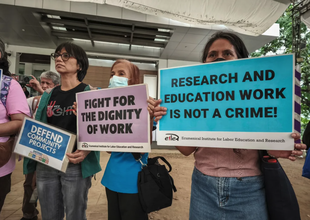Electronics Watch statement in support of The Ecumenical Institute for Labor Education and Research (EILER)
Electronics Watch stands in solidarity with EILER, its monitoring partner in the Philippines since 2022, which is facing repeated incidences of red-tagging.
 Photo: Altermidya
Photo: Altermidya
Red-tagging is state-sponsored repression, where organisations are falsely branded as terrorists or accused of having links to armed groups. The tactic is used to attack individuals and organisations legally working for social justice and workers' rights, and has a chilling effect on fundamental freedoms.
EILER reports three incidents of red-tagging directed against them between December 2024 and February 2025. On each occasion, signs placed on or close to EILER headquarters claimed the organisation was a "terrorist recruiter".
This follows a 2021 attack from the Bureau of Immigration and the state intelligence agency NICA, which resulted in the deportation of a foreign EILER staff member who had lived in the Philippines for over two decades.
The latest red-tagging incidents against EILER come as development workers and NGOs in Luzon, Visayas and Mindanao are being accused of financing or otherwise supporting terrorism. Four workers from two different NGOs are falsely charged with engaging government soldiers in firefights or ambushing security guards. Seven workers from two other NGOs have been designated as terrorists. The Center for Trade Union and Human Rights has recorded 80 cases of red-tagging and harassment since Marcos Jr came to power. In a survey of non-profit organisations conducted in November 2024 by the Council for People's Development and Governance (CDPG), 62% reported experiencing red-tagging. 31% have been accused of funding terrorism, and 15% face legal cases related to these accusations.
EILER now finds itself part of the statistics. The organisation is forced to divert scarce resources to legal defence and damage control instead of focusing on its mission to workers. Its ability to operate is reduced and its reputation damaged, with a risk of losing donors and partners who fear they will be considered guilty by association. Being labelled as terrorists puts staff in danger of state "shoot to kill" policies, and one person reports being followed.
"It is mentally exhausting, it makes us anxious, and staff are at risk. At least 69 development workers and 29 NGOs or networks in the country are being harassed with fake charges related to terrorism. It takes away our liberty to function free from stigma," said one EILER staff member. "Red-tagging creates fear, leading to self-censorship or a toning down of our stance on pressing issues for workers such as living wages and freedom of association. That is the main goal of red-tagging, to prevent you from campaigning for workers and people's rights by stifling your operations, even if it is a very small NGO like us. If we are charged with anything related to terrorism, no one would believe it, but we will be prevented from delivering our essential services to the Filipino workers."
The International Trade Union Confederation consistently ranks the Philippines as one of the ten worst countries in the world for violations of workers' rights. Harassment, intimidation, and killing of activists and union members with impunity sends a chilling message to all workers in the Philippines. It forms part of a deliberate strategy to stop workers from trying to claim their human rights at work and undermines the fundamental right to freedom of association and collective bargaining.
Governments and business must work with civil society to ensure labour rights activists and trade union members can exercise their rights and help build safe, healthy, and secure workplaces without fear.
You can read EILER's statement about the red-tagging incidents here.

